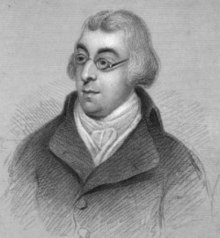Isaac D'Israeli
This article needs additional citations for verification. (July 2017) |
Isaac D'Israeli | |
|---|---|
 Isaac D'Israeli in a portrait from 1797 | |
| Born | 11 May 1766 |
| Died | 19 January 1848 (aged 81) Bradenham, Buckinghamshire, England |
| Nationality | British |
| Alma mater | Leiden University |
| Occupation(s) | Writer and scholar |
| Years active | 1782–1848 |
| Employer | John Murray |
| Spouse |
Maria Basevi
(m. 1802; died 1847) |
| Children | 5, including Benjamin Disraeli |
| Parents |
|
Isaac D'Israeli (11 May 1766 – 19 January 1848) was a British writer, scholar and man of letters. He is best known for his essays, his associations with other men of letters, and as the father of Prime Minister Benjamin Disraeli.
Life and career
Isaac was born in Enfield, Middlesex, England, the only child of Benjamin D'Israeli (1730–1816), a Jewish merchant who had immigrated from Cento, Italy in 1748, and his second wife, Sarah Syprut de Gabay Villa Real (1742/3–1825). Isaac received much of his education in Leiden. At the age of 16, he began his literary career with some verses addressed to Samuel Johnson. He became a frequent guest at the table of the publisher John Murray and became one of the noted bibliophiles of the time.
On 10 February 1802, D'Israeli married Maria Basevi (1774/5–1847), who came from another London merchant family of Italian-Jewish extraction. The marriage was a happy one, producing five children: Sarah ("Sa"; 1802–1859); Benjamin ("Ben" or "Dizzy"; 1804–1881); Naphtali (b. 1807, died in infancy); Raphael ("Ralph"; 1809–1898); and Jacobus ("James" or "Jem"; 1813–1868). The children were named according to Jewish customs and the boys were all circumcised. Religiously, however, Isaac D'Israeli appears to have set aside his Jewish beliefs. In the midst of an eight-year dispute with the Bevis Marks Synagogue and on the advice of his friend, historian Sharon Turner, all his children were baptised into the Church of England in 1817. In 1833 he published a severely critical analysis of contemporary Judaism, The Genius of Judaism. He himself did not receive baptism, however, and never indicated any desire to exchange Judaism for Christianity. He did attend the inauguration ceremonies of the Reform Synagogue at Burton Street, London.
He penned a handful of English adaptations of traditional tales from the Middle East, wrote a few historical biographies, and published a number of poems. His most popular work was a collection of essays entitled Curiosities of Literature. The work contained myriad anecdotes about historical persons and events, unusual books, and the habits of book-collectors. The work was very popular and sold widely in the 19th century, reaching its eleventh edition (the last to be revised by the author) in 1839.[1] It was still in print when the Encyclopædia Britannica entry was written in 1911. His book The Life and Reign of Charles I (1828) resulted in his being awarded the degree of D.C.L. from Oxford University.
In 1841, he became blind and, though he underwent an operation, his sight was not restored. He continued writing with his daughter as his amanuensis. In this way he produced Amenities of Literature (1841) and completed the revision of his work on Charles I. He died of influenza at age 81, at his home, Bradenham House, in Buckinghamshire, less than a year after the death of his wife in the spring of 1847.
D'Israeli's daughter-in-law, the wife of his eldest son, Benjamin, erected a monument to him in June 1862 following his death. It stands on a hill near Hughenden Manor, the Disraelis' country house in Buckinghamshire.[2]
Major works
- Curiosities of Literature (5 vols. [1791–1823]; 3 vols. [1824])
- A Dissertation on Anecdotes [1793]
- An Essay on the Literary Character [1795]
- Miscellanies; or, Literary Recreations [1796]
- Romances [1799]
- Amenities of Literature [1841]
- Calamities of Authors [1812–3]
- Quarrels of Authors [1814]
- The Genius of Judaism [1833]
References
- ^ [1] (author's preface to the 1839 edition, from the complete text as listed under External Links)
- ^ Historic England, "Disraeli Monument (1125201)", National Heritage List for England, retrieved 22 November 2017
External links
- Works by Isaac Disraeli at Project Gutenberg
- Works by Isaac D'Israeli at LibriVox (public domain audiobooks)

- Works by or about Isaac D'Israeli at the Internet Archive
- Complete text of the Curiosities Of Literature.
- Chisholm, Hugh, ed. (1911). . Encyclopædia Britannica (11th ed.). Cambridge University Press.
- Use dmy dates from May 2012
- 1766 births
- 1848 deaths
- 19th-century English non-fiction writers
- 19th-century English male writers
- 19th-century Sephardi Jews
- Bibliophiles
- Blind people from England
- Deaths from influenza
- English Jewish writers
- English male non-fiction writers
- English non-fiction writers
- English people of Italian-Jewish descent
- English Sephardi Jews
- People from Enfield Town
- Parents of Prime Ministers of the United Kingdom
